By David Shepardson
WASHINGTON (Reuters) – A bipartisan group of lawmakers asked the CEOs of six major auto parts retailers if they bought products from a Chinese company that may have evaded U.S. tariffs, according to letters seen by Reuters on Friday.
Representative John Moolenaar, a Republican who chairs a House panel on China, and the committee’s top Democrat Raja Krishnamoorthi, along with other lawmakers, asked AutoZone, O’Reilly Auto Parts, Genuine Parts, Advance Auto Parts, First Brands Group, and Factory Motor Parts to address concerns they are purchasing parts from China’s Qingdao Sunsong and its U.S.-based subsidiary.
The lawmakers – which also included Senators Sherrod Brown, a Democrat and Republican Bill Cassidy – raised concerns Qingdao may be illegally transshipping Chinese products through Thailand into the United States to evade U.S. customs duties.
The companies did not immediately respond to requests for comment or could not be reached.
“U.S. retailers are responsible for ensuring their procurement practices do not inadvertently support companies engaged in tariff evasion or other unlawful trade practices,” said the letters, which asked a list of questions about purchases and company efforts to ensure compliance with U.S. trade laws.
The letters, signed also by Representatives Darin LaHood, Glenn Ivey and Ashley Hinson, cited a report that U.S. officials raided Qingdao Sunsong’s U.S. subsidiary in January and public company disclosures reveal that U.S. auto part retailers including AutoZone, Advance Auto Parts, and O’Reilly account for more than 40% of Qingdao Sunsong sales.
In 2019, the United States adopted new 25% tariffs on some Chinese auto parts, including rubber hose assembly products that were produced by Qingdao Sunsong.
The lawmakers said that company established a transshipping facility for these goods in Thailand and cited a company filing revealing that “the primary objective of its investments in Thailand is to circumvent U.S. tariffs and allow for the low-cost shipment of goods to U.S. auto part retailers.”
(Reporting by David Shepardson; Editing by Andrea Ricci)





